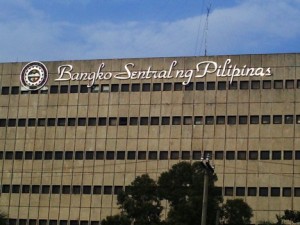MANILA, Philippines–Foreign portfolio investments to the Philippines posted a net outflow in March as concerns over the crisis in the euro zone, punctuated by the debt woes of Cyprus, prompted fund owners to liquefy some of their emerging-market assets.
The Bangko Sentral ng Pilipinas reported Thursday that foreign “hot money” registered a net outflow of $395.14 million during the month, a reversal of the $183.74 million in net inflow in the same month last year.
Portfolio investments, or hot money, include investments in stocks, corporate bonds, government securities, and even bank deposit products.
“The drop was due mainly to profit-taking as well as continuing concerns about the euro zone,” the BSP said in a statement.
Gross inflow of foreign portfolio investments during the month hit $2.33 billion, almost a billion dollar higher than the $1.35 billion in the same month last year.
However, the increase in the gross inflow was wiped out by the rise in withdrawals, which were triggered by jitters caused by problems in the euro zone. The outflows reached $2.73 billion, up from $1.16 billion.
Reports of debt woes of Cyprus were released in March, when international creditors required the country’s government to impose taxes on bank accounts so that the public will have a share in the burden of paying the country’s huge debts. The taxes on bank accounts, which were set as high as 10 percent, were unprecedented and elicited concerns that the same could be implemented in other indebted countries.
BSP officials said the developments in the euro zone rattled financial markets worldwide.
Nonetheless, for the entire first quarter, foreign portfolio investments to the Philippines still managed to record a significant increase in net inflow. This was because of the gains in the first two months of the year.
Data showed that net inflow of foreign “hot money” for the first quarter amounted to $1.087 billion, more than double the $464.45 million registered in the same period last year.
This was a result of the gross inflow of $7.26 billion, which was up from $4.055 billion in the same three-month period last year, and the outflows of $6.18 billion, which was up from $3.59 billion.
According to the BSP, the biggest sources of foreign portfolio investments to the Philippines were the United Kingdom, the United States, Hong Kong, Singapore, and Luxembourg.
The BSP earlier projected that for the entire 2013, foreign portfolio investments could register a net inflow of $3 billion.
This projection is under review as officials take into account recent developments that could affect appetite for peso-denominated securities.
One major consideration is the Philippines’ attainment of its first-ever investment grade from a major international credit rating agency.
On the last trading day prior to the Lenten break, Fitch Ratings raised the country’s credit rating by a notch to BBB-, which is the minimum investment grade.
Government officials said the investment grade could boost demand for peso-denominated securities in the months ahead.
